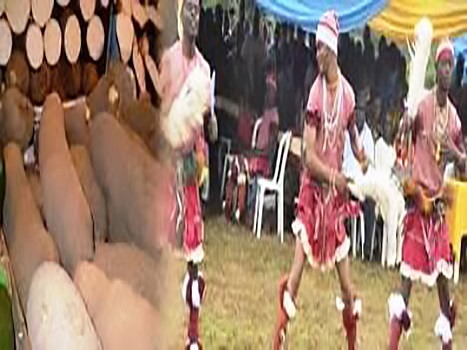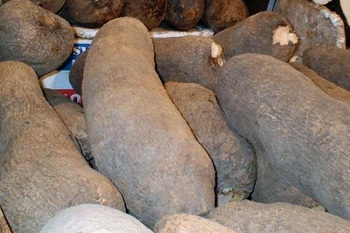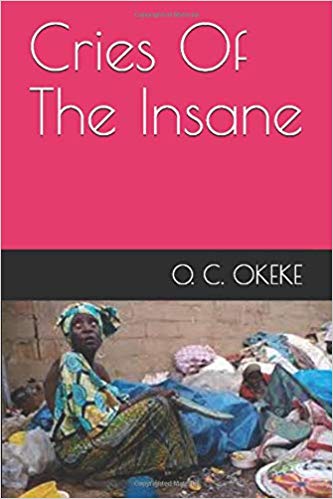NEW YAM FESTIVAL
 New yam festival is a ceremony used to open doors for the eating of newly cultivated yams after a successful farming season. It is known as Orureshi in Idoma west (Benue State of Nigeria), Owe Festival in Ondo (South Western Nigeria), Homowo (Ghana) and Ima Ji, Iri Ji, Ike Ji, Njoku or Iwa Ji in Igbo land (South Eastern Nigeria). The festival is celebrated in its unique purpose and aims as it marks the official presentation of a newly cultivated tuber of yam to God Almighty and the ancestors of the land. Also, thanking God for protecting and sustaining the life of the farmers, the indigenes of the land and the farm product (the yam) through a successful season of agriculture. The festival is as old as tradition in Igbo Land, and Benue State, of Nigeria.
New yam festival is a ceremony used to open doors for the eating of newly cultivated yams after a successful farming season. It is known as Orureshi in Idoma west (Benue State of Nigeria), Owe Festival in Ondo (South Western Nigeria), Homowo (Ghana) and Ima Ji, Iri Ji, Ike Ji, Njoku or Iwa Ji in Igbo land (South Eastern Nigeria). The festival is celebrated in its unique purpose and aims as it marks the official presentation of a newly cultivated tuber of yam to God Almighty and the ancestors of the land. Also, thanking God for protecting and sustaining the life of the farmers, the indigenes of the land and the farm product (the yam) through a successful season of agriculture. The festival is as old as tradition in Igbo Land, and Benue State, of Nigeria.
YAM THE CHIEF AGRICULTURAL CROP IN WEST AFRICA
New yam festival is a celebration of yam, the chief staple crop of the people of West Africa (especially Ghana and Nigeria). Yams are also cultivated and eaten in many parts of the world including West Indies, African, India, Asian and South America to name a few. However, few countries like Ghana and Nigeria take it as their main agricultural crop and their staple food. Yam comes in various species and in Igboland we have yams such as Nne Ji, Ji Igwe, Ji Oko, Ji Ocha, Oke Ji, Ji Aga, Ji Ogbaga, Ji Okpozu, Ji Abala, Ji Akakpo, Ji Opani, Ji Ibibi, etc. Yam dishes come either as roasted yam eaten with palm oil sauce; Ji Miri Oku (Pepper soup yam); Yam Porridge; Utara Ji (Pounded yam) eaten with vegetable soup; Etc.The traditional Igbo man takes Yam as the most important crop and takes pride in showing off his yam barn neatly stacked with yam tubers from top to bottom. It signifies wealth and success. In the old days, a common question asked by a bride's father when a young man signifies his intention to marry his daughter is "how big is your yam barn"? A big yam barn means the man is hard working and can take care of his daughter. Yam is regarded as chief of all crops and taken very importantly. Till today, it is a capital offence to steal yam in Igbo land.
THE NEW YAM FESTIVAL DAY
New yam festival is held at the end of rainy seasons, which differs in different communities but normally starting from early August to October, during which new yams are ripe for harvesting. It is customary that no one eats new yams until a day that is traditionally set aside for the eating. Old yams are consumed or discarded before the D-Day and on the day of the celebration only dishes of yam are served as the festival is symbolic of the abundance of the produce. Traditionally, the role of eating the first yam is performed by the eldest man in the community or the Igwe (king) and roasted yams, coupled with red oily sauce is normally used in the ceremony.The Festival rite, in Igbo Land, is started with the ritual master (usually a Chief Priest) cutting one new yam tuber into four pieces, (which in Igbo custom represents the four market days otherwise called Izu) at the same time praying and making incantations, invoking the spirits of the ancestors, praying them to continue to intercede with the homesteads in their quest for Vital life to promote longevity and prosperity in the community. He cuts the throat of Oke Okpa, (cockerel), smears the blood on the Soil. In so doing, he acknowledges Ala (Land) the Mother of peace, of fertility and as the custodian of morality in the land "and the controller of fortune and economic life". He prays to Ahianjoku (yam deity) to continue to prosper the growth and cultivation of yam in Igbo land. He concludes with other prayers for good health, protection against diseases and infertility of land, people and domestic animals. He does these prayers making incantations and pouring libations to the gods and ancestors.
After the Prayer has ended, the king or eldest man in the community will be presented with whole fat roasted yams. He cuts one or two into slices, take a slice which he dips into a palm oil sauce and eat. The roasted yam slices are then passed to other people present, starting with the elders, to eat as the king has eaten. This marks the starting of the New Yam Festival. People can now go and continue to eat proper dishes of new yam.
 New yam festival normally takes four days, and a week in some communities. Prominent men and women, in-laws, friends of families from other villages are invited to grace the festival. Series of activities and contests are lined up to occupy the days of the ceremony. There are royal, age grade, cultural and women dance competitions, traditional wrestling competitions and masquerade display of all shapes, colour and sizes. Also there is Yam Fair and great yam farmers' competition where farmers present their biggest tubers for contest. From here, such great titles as Eze Ji (yam chief), Di Ji (expert yam cultivator), Mbazu Igwe (iron digger), Oji Aka Leri Ala (a specialist hand weeder of the land) are usually conferred on men who have distinguished themselves as great yam farmers and keepers of large barns (Oba Ji). Emume Iri Ji Ohuru (New yam festival) ranks as the most esteemed of Igbo festivals due to the respect given to the ceremony across Igbo land.
New yam festival normally takes four days, and a week in some communities. Prominent men and women, in-laws, friends of families from other villages are invited to grace the festival. Series of activities and contests are lined up to occupy the days of the ceremony. There are royal, age grade, cultural and women dance competitions, traditional wrestling competitions and masquerade display of all shapes, colour and sizes. Also there is Yam Fair and great yam farmers' competition where farmers present their biggest tubers for contest. From here, such great titles as Eze Ji (yam chief), Di Ji (expert yam cultivator), Mbazu Igwe (iron digger), Oji Aka Leri Ala (a specialist hand weeder of the land) are usually conferred on men who have distinguished themselves as great yam farmers and keepers of large barns (Oba Ji). Emume Iri Ji Ohuru (New yam festival) ranks as the most esteemed of Igbo festivals due to the respect given to the ceremony across Igbo land.
MODERN DAY PRACTICE
For many Igbo people, Iri Ji Ohuru Festival ranks as the most esteemed of Igbo festivals. In many Igbo communities, towns and villages, it is celebrated and considered as very big ceremony, even bigger than Christmas and Easter celebration. It is also becoming a worldwide festival as the Igbos carry it to everywhere they live or find themselves. For example, On July 26, 2003, Nzuko Umuigbo (Gathering of Igbo Children) Germany celebrated Iri Ji Ohuru in the diaspora; On August 13, 2005, the Igbo Community in Belgium held a rousing social gathering in cooperation with the representatives of the City of Antwerp, and with the presence of the then Ambassador of the Federal Republic of Nigeria to the Kingdom of Belgium, Mr. Clarkson Nwakanma Umelo and his entourage, at which they celebrated Iri Ji Ohuru; In the USA, Igbo businesswomen and businessmen, students and their African American friends who identify themselves with the Igbo people perform the festival annually; Etc.However, New yam festival is dying, even no longer celebrated, in some communities and villages due to Christian religion. The Christians, who form majority opinion in these communities, hold that the festival is evil and see it as another form of worshipping idol. They refuse to participate in any rite and regulations concerning the Iri Ji Ohuru thus, killing the annual celebrations.
An Afryculture member remembers when he was growing up, on one Sunday in the church. An influential and well respected elder stood up and made the announcement that all church members should no longer follow the pagans to celebrate Njoku (New yam festival, as it is called in his Village). The elder explained that the practice is evil and against the doctrine of the Bible. He further explained the meaning of Njoku as Deadly Sin (Njo Oku - Worst Sin). All the church members were convinced, and previously, it was noticed that many youths die immediately after new yam festival and masquerade display. From that day, Church members no longer take interest in the celebration, killing the festival till today.
AfryCulture Viewpoint
New yam festival is a cultural based occasion, celebrated to bind individual communities together as essentially farmers and traditionally dependants on yam. It is a time of thanksgiving to Chukwu (God Almighty) for making the farm yields possible and praying for good yields for the next planting season. The colourful, cultural, full of local music, dances, competitions, other activities and merriments, way that it is celebrated bring joy, happiness, hence healthiness of the people of the communities.AfryCulture believe that the festival is a very rich culture that showcases the origin of the people. It should not be stopped but should be modernized removing any aspect of idol worship (like incantations, etc.) and some evil practice that make youths, who play the masquerades, to die after the festival (it is said that they challenge themselves with charms to show which is stronger). The name "Njoku", for example, can be removed and be called "Iri Ji Ohuru" or simply "Iri Ji".
